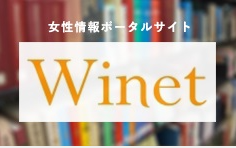International Cooperation
- HOME
- International Cooperation
- NWEC Global Seminar
- FY2017 NWEC Global Seminar: Promotion for Advancement of Women Lessons from Germany
NWEC Global Seminar
- Event Report
-
FY2017 NWEC Global Seminar: Promotion for Advancement of Women Lessons from Germany
Date:December 7, 2017
Place:Shufu Kaikan Plaza F /
On Thursday, December 7th, 2017, the National Women’s Education Center of Japan hosted the 2017 NWEC Global Seminar under the theme of “Promotion for Advancement of Women – Lessons from Germany” at Shufu Kaikan Plaza F (Chiyoda-ku, Tokyo), where active discussions among over 80 participants took place.
The keynote speaker for Part I, Ms. Ulrike Helwerth, the International Gender Equality Policy Advisor of the National Council of German Women’s Organizations, gave a comprehensively detailed report concerning initiatives taken in Germany to promote gender equality, entitled “Unfinished Business – Gender Equality in the 21st Century: The German Case.” She primarily explained the current situation of labor, disparity, and leadership, and emphasized that “gender equality is a prerequisite for a fair and sustainable society, which bears gender democracy in its mind and heart.”
Ms. Helwerth has long worked as the Communications Director for the National Council of German Women’s Organizations, and since 2015, has advised the international community on trends of gender equality policies as well as participated in lobbying activities. From such an active background, she clarified Germany’s present condition. The problems she brought up were wide-ranging, including education, women in the labor market, the gender pay gap, leadership quotas in politics, and violence against women. There were detailed explanations of legal actions which built up the roots of gender equality policies in Germany, such as establishment of childcare facilities targeting all children, parental allowances, and paid holidays to provide nursery care for other family members. Moreover, in conclusion, she sent a powerful message that equality is something that requires effort, we are only halfway there, and that consistent initiatives are indispensable.
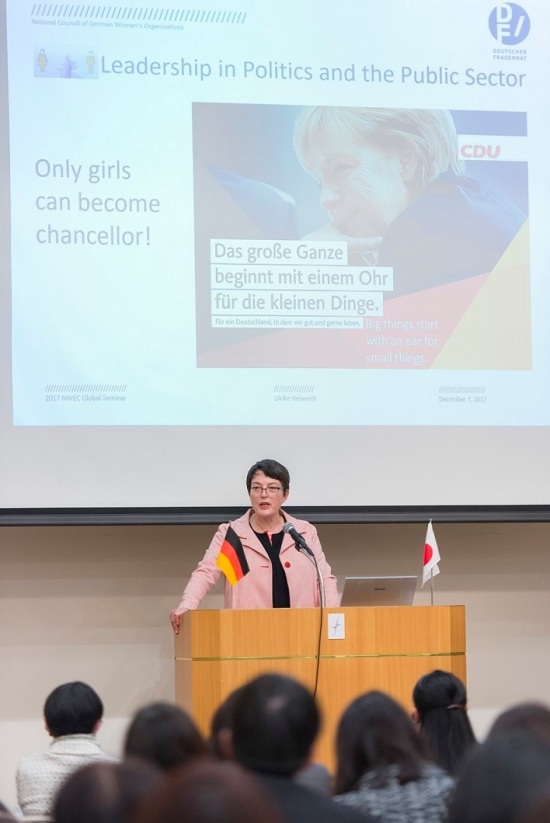 Part I Keynote speech delivered by Ms. Ulrike Helwerth
Part I Keynote speech delivered by Ms. Ulrike Helwerth
The Part II panel discussion, under the theme of “Promoting Women’s Participation in Private Sectors,” was an enthusiastic report and debate. The current state and challenges faced by Germany are highly suggestive to Japanese society. Regarding the situation of initiatives in the Japanese private sector, the current state and problems were made clear from the standpoint that diversity has been promoted within organizations.
Dr. Karen A. Shire, who belongs to two institutes; the Institute for Global Leadership, Ochanomizu University and the Institute of Sociology and Institute of East Asian Studies, University of Duisburg-Essen, introduced “What causes Gender Inequalities in Work and Employment? Germany and Japan in Comparison,” which is centered on the contrast between the two countries.
She indicated similarities between Germany and Japan, and rationalized them by labor and employment based on detailed data from the perspective of looking into problems they can learn from each other. Despite systematic differences of Germany having socially democratic ideology at its base, while conversely Japan, at its foundation, being a liberal marketplace, she figured out the similarity is that both are conservative, familial welfare countries. Concerning how economic activities are gendered in Germany, she, based on the data, explained the current condition of a high participation rate of women in the workforce, and a 40% rate of women working as part-time employees. As there is no demonstration of female leadership in the economic realm, nor progress of reform in masculine corporate culture reigns, she pointed out as the future challenges that women’s participation in the political realm is not moving forward.
 Dr. Karen Shire
Dr. Karen Shire
Ms. Noriko Morikawa, Executive Vice President of Bosch Corporation, from the standpoint of strongly promoting women’s active participation, introduced concrete examples of Bosch Japan’s activities under the theme “Promoting Women’s Participation in Private Sectors.” Main examples of those activities included holding lectures and/or panel discussions targeting female engineers and their superiors, conducting diversity trainings aimed at senior management positions, as well as training aimed at those returning from maternity leave and their superiors. She especially left the impression that they listen to their employees’voices and are making efforts that properly reflect their needs. She also introduced details of one more initiative Bosch has been putting energy into worldwide since 2014: International Diversity Day. In Japan, they offered speeches by male lecturers that males want to hear which would touch hearts of male managers, open discussion with males experienced with paternal leave, team activity presentations, and provided diversity special menus at canteen. These activities based on diverse yet innovative ideas were very interesting.
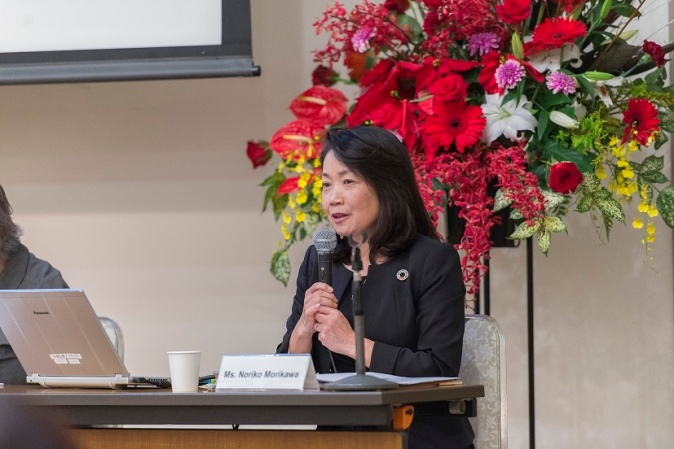 Ms. Noriko Morikawa
Ms. Noriko Morikawa
The coordinator, Dr. Sachiyo Onishi, as a specialist on gender in the context of law and policy, neatly arranged difficult questions as to what should be done, or how something can be done to make rapid progress for women’s active participation hereafter. Based on her logic-constructed leadership, the debate, which searched for solutions, even further intensified.
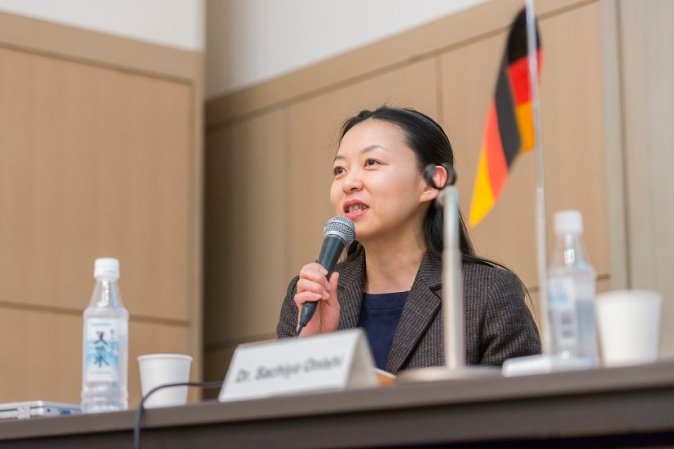 Dr. Sachiyo Onishi
Dr. Sachiyo Onishi
Keynote speaker Ms. Helwerth also joined and carefully answered many enthusiastic questions from the floor.
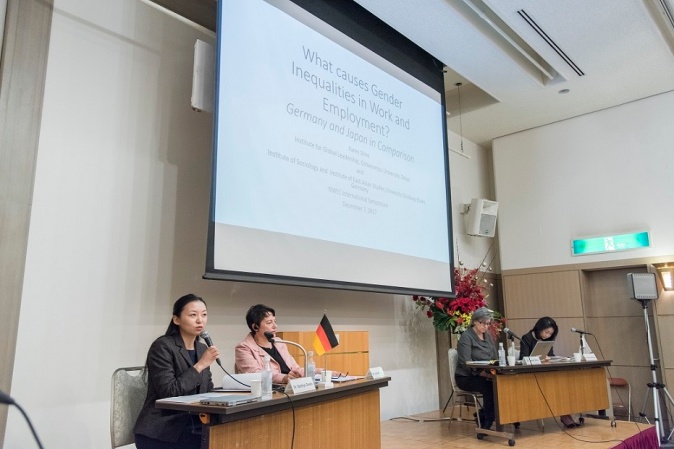 PartⅡ Panel Discussion
PartⅡ Panel Discussion
In the question and answer section, questions covering much ground came one after another, resulting in an active discussion.
The questions continued, to Ms. Helwerth regarding the current situation of part time workers, fathers taking paternity leave, and the taxation system; to Dr. Shire regarding issues and results of quota systems; and to Ms. Morikawa, regarding the realities of returning from maternity leave and diversity programs. Among the answers were for women to excel, and how it is important for them to continue to work; quota systems being merely a single tool, and not to be considered a silver bullet; as well as both men and women needing to overcome the tendency to lose self-confidence due to unconscious bias. They served as topics to consider in the future and concluded the seminar.
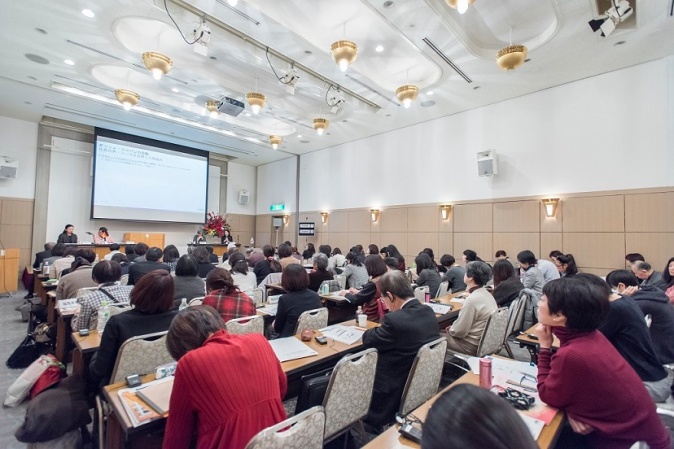 Interactive discussion with the floor
Interactive discussion with the floor
Through the keynote address, panel discussion, and question and answer session with participants, it was understood that advanced and abundant initiatives taken by Germany, which has led to gender equality and women’s participation are highly suggestive to the Japanese society of today. It was a meaningful seminar, which made clear Japan’s future direction.
International Cooperation
- International Seminar
- FY2019 Seminar for Gender Equality Officers and Women Leaders in the Asia Region
- FY2018 Seminar for Gender Equality Officers and Women Leaders in the Asia Region
- FY2017 Seminar for Gender Equality Officers and Women Leaders in the Asia Region
- FY2016 Seminar for Gender Equality Officers and Women Leaders in the Asia Region
- FY2015 Seminar for Gender Equality Officers and Women Leaders in the Asia Pacific Region
- FY2014 Seminar for Gender Equality Officers and Women Leaders in the Asia Pacific Region
- FY2013 Seminar for Gender Equality Officers and Women Leaders in the Asia Pacific Region
- FY2012 Seminar for Gender Equality Officers and Women Leaders in the Asia Pacific Region
- FY2011 Seminar for Gender Equality Officer and Women Leaders in the Asia Pacific Region
- FY2010 Empowerment Seminar for Women Leaders in the Asia Pacific Region
- FY2009 Empowerment Seminar for Women Leaders in the Asia Pacific Region Final Report
- FY2008 Empowerment Seminar for Women Leaders in the Asia Pacific Region
- FY2007 Empowerment Seminar for Women Leaders in the Asia Pacific Region
- FY2006 Empowerment Seminar for Women Leaders in the Asia Pacific Region
- NWEC Global Seminar
- FY2025 NWEC Global Seminar: Addressing Technology-Facilitated Gender Based Violence (TFGBV): Approaches to Eradicate the Invisible Harm
- FY2024 NWEC Global Seminar: Gender Equality and Care
- FY2023 NWEC Global Seminar: Gender Mainstreaming & Strengthening Institutional Mechanism with Gender Perspective
- FY2022 NWEC Global Seminar: Does Digital Technology Advance Gender Equality?
- FY2021 NWEC Global Seminar: Combating Gender-Based Violence – “Building Back Better” from the Covid-19 Crisis
- FY2020 NWEC Global Seminar: Covid-19 and Gender
- FY2019 NWEC Global Seminar: Gender and Media
- FY2018 NWEC Global Seminar: Promotion of the Advancement of Women - What Japan can learn from Iceland about Gender Equality?
- FY2017 NWEC Global Seminar: Promotion for Advancement of Women Lessons from Germany
- FY2016 NWEC Global Seminar: Promotion for Advancement of Women –Lessons from Europe
- FY2015 International Symposium: Gender Equality and Women's Empowerment
- FY2014 International Symposium: Keys to Diversity and Women's Leadership
- FY2013 NWEC International Symposium:Gender Equality for Men
- FY2012 NWEC International Symposium:To Make a Society without Violence against Women a Reality
- FY2011 NWEC International Symposium
- FY2010 International Forum for Women's Empowerment
- FY2009 International Forum for Women's Empowerment
- FY2008 International Forum for Women's Empowerment Final Report3
- FY2008 International Forum for Women's Empowerment Final Report2
- FY2008 International Forum for Women's Empowerment Final Report1
- Cooperation with JICA
- FY2025 Knowledge Co-Creation Program (KCCP): "Promotion of Global Networking on Anti-Trafficking in Persons"
- FY2025 Knowledge Co-Creation Program "Eradicating Sexual and Gender-Based Violence (SGBV)"
- FY2025 Knowledge Co-Creation Program: Bangladesh “Strengthening Capacity to Address Gender-Based Violence"
- FY2024 Knowledge Co-Creation Program on "Promotion of Global Networking on Anti-Trafficking in Persons"
- FY2024 Knowledge Co-Creation Program "Eradicating Sexual and Gender-Based Violence (SGBV)"
- FY2023 Knowledge Co-creation Program "Promotion of Networking among ASEAN Countries on Anti-Trafficking in Persons”
- FY2023 Knowledge Co-Creation Program "Eradicating Sexual and Gender-Based Violence (SGBV)"
- FY2022 Knowledge Co-creation Program "Promotion of Networking among ASEAN Countries on Anti-Trafficking in Persons”
- FY2022 Knowledge Co-Creation Program "Eradicating Sexual and Gender-Based Violence (SGBV)"
- FY2021 Knowledge Co-creation Program "Promotion of Networking among ASEAN Countries on Anti-Trafficking in Persons”
- FY2020 Knowledge Co-creation Program "Promotion of Networking among ASEAN Countries on Anti-Trafficking in Persons”
- FY2019 Knowledge Co-creation Program "Promotion of Networking among ASEAN Countries on Anti-Trafficking in Persons”
- FY2018 Knowledge Co-creation Program "Promotion of Networking among ASEAN Countries on Anti-Trafficking in Persons”
- Issue-specific Training “Seminar on Promotiom of Networking among ASEAN Countries on Anti-Trafficking in Persons”
- Basic Information-Gathering Survey/Workshop Seminar on the Economic Independence for Women in Central America and the Caribbean (El Salvador/Dominican Republic)
- Regional Gender Seminar in Central and South America
- 2015 Issue-specific Training "Seminar on Promotion of Networking among Asian Countries on Anti-Trafficking in Persons"
- Seminar on the Promotion of Education for Girls and Women II
- International Conference/International Exchange
- Visit by Professor Hilado from the University of the Philippines Visayas
- Online meeting with Seisen International School elementary students
- Visitor: Mansfield Fellows
- Visitor:JICA Knowledge Co-Creation Program (KCCP) on "Women's Empowerment through Business for Central American Integration System (SICA) Member Countries"
- The 68th Session of the Commission on the Status of Women
- Visitor: Madam Sustjie Mbumba, First Lady of the Republic of Namibia
- Workshop of commemorating the donation of the Beate Shirota Gordon archive materials
- Meeting with Korean Women’s Development Institute (KWDI)
- The Coalition of Finnish Women's Associations (NYTKIS) Secretary General Ms. KAKKOLA’s Courtesy Call to Foreign Minister KAMIKAWA
- The Coalition of Finnish Women's Associations (NYTKIS) Secretary General Ms. KAKKOLA’s Japan Visit Program
- The 67th Session of the Commission on the Status of Women
- NGO CSW67 Forum
- Webinar with Korean Women’s Development Institute (KWDI)
- The 66th Session of the Commission on the Status of Women (Hybrid format)
- Online meeting with international graduate students from the Appropriate Technology course at the University of Tsukuba
- The 65th session of the Commission on the Status of Women
- Lecture "The Beate Sirota Gordon Archives at Mills College"
- Participation in 2nd AGenT
- The 64th session of the Commission on the Status of Women
- Dr. Wang from National Taiwan University visits NWEC
- Japan Network of Women Engineers and Scientists and The Japan Inter-Society Liaison Association Committee for Promoting Equal Participation of Men and Women in Science and Engineering: 9th Japan Korea China Women Leaders Forum for Science & Technology
- Researcher from the KWDI visits NWEC
- Visit by a delegation from the Socialist Republic of Vietnam Ministry of National Defense
- Briefing on the Reykjavik Index for Leadership
- Women's Archives Center Exhibition "Beate Sirota Gordon and gender equality in Japanese Constitution"
- Visit from the Guangxi Women’s Federation
- Participation in the 63rd Session of the Commission on the Status of Women
- 7th Global Forum on Gender Statistics
- FY2018 International Symposium hosted by Korean Institute for Gender Equality Promotion and Education “Gender Equality at Schools”
- Visit from All-China Women’s Federation(ACWF)
- Participation in the 62nd Session of the Commission on the Status of Women
- The 14th KIGEPE International Symposium “Empowering Women’s Leadership: expanding influence and innovation”
- Participation in the 61st Session of the Commission on the Status of Women
- Visit from the Batis Center for Women
- 2011 Asia Women Eco-Science Forum (a forum of science and engineering leaders in Japan, China and Korea)
- The 60th Session of the Commission on the Status of Women
- The 59th Session of the United Nations Commission on the Status of Women
- The 58th Commission on the Status of Women
- The 57th Session of the United Nations Commission on the Status of Women
- International Symposium: Gender Awareness Education for Sustainable Development
- Thirtieth Anniversary Programs
- Attendance at the Ceremony Commemorating the 25th Anniversary of the Korean Women’s Development Institute (KWDI)
- Japanese-Filipino children (JFC)* from the Philippines-based NGO “DAWN” visit the Center
- Visitors from Abroad to NWEC
- Research report on Multicultural Family Support in South Korea
- Workshop on Gender and Education: Life-long Learning for Women’s Empowerment
- Lecture Delivered by a Visiting Researcher
- Connections: Bringing Together the Next Generation of Women Leaders in Science, Technology, Engineering and Mathematics
- Conclusion of Memorandum of Understanding on Exchange and Cooperation with the Ministry of Women's Affairs, Royal Government of Cambodia
- Visit to Japan by the Minister of Women’s Affairs of the Royal Government of Cambodia
- KIGEPE Delegation Visit
- Officials of Ministry of Information and Communications of the Socialist Republic of Vietnam visited NWEC
- The 56th Commission on the Status of Women
- Dr. Barker's visit
- Multidisciplinary Intellectual Exchange for Women Leaders from the United States, Japan, South Korea and the Philippines
- Courtesy visit to University of Hawai`i
- Delegation of Board for the Advancement of Women, Ministry of Finance of the Socialist Republic of Vietnam visited NWEC
- Visit Korean Women's Development Institute (KWDI)
- Report on Participation in the 5th World Social Forum on Migration
- A group led by the Vice President of the Korean Women's Development Institute visited NWEC
- A disaster management specialist from India visits the Center
- Visit to the Korean Institute for Gender Equality Promotion & Education (KIGEPE) and others
- Secretary of State, Ministry of Justice, Kingdom of Cambodia visited NWEC
- Research conducted in the Republic of the Philippines
- Research on the Comparative Study of the Gender Equality Policy in Southeast Asian Countries in the Kingdom of Cambodia
- Ochanomizu University and A Canadian Women’s Study Researcher visited NWEC
- Aigyung Yang, Research Fellow and Former Director of Strategy Board for Women Friendly Policies of the Korean Women's Development Institute (KWDI) Visits NWEC
- Delegation of the Ministry of Defense of the Socialist Republic of Vietnam visited NWEC
- Delegation from the Women and Development Center, of the Vietnam Women's Union, Visited NWEC
- The "7th Asia-Pacific Forum on Development and Gender" was held in Seoul, South Korea
- HOME
- International Cooperation
- NWEC Global Seminar
- NWEC Global Seminar
- FY2017 NWEC Global Seminar: Promotion for Advancement of Women Lessons from Germany



